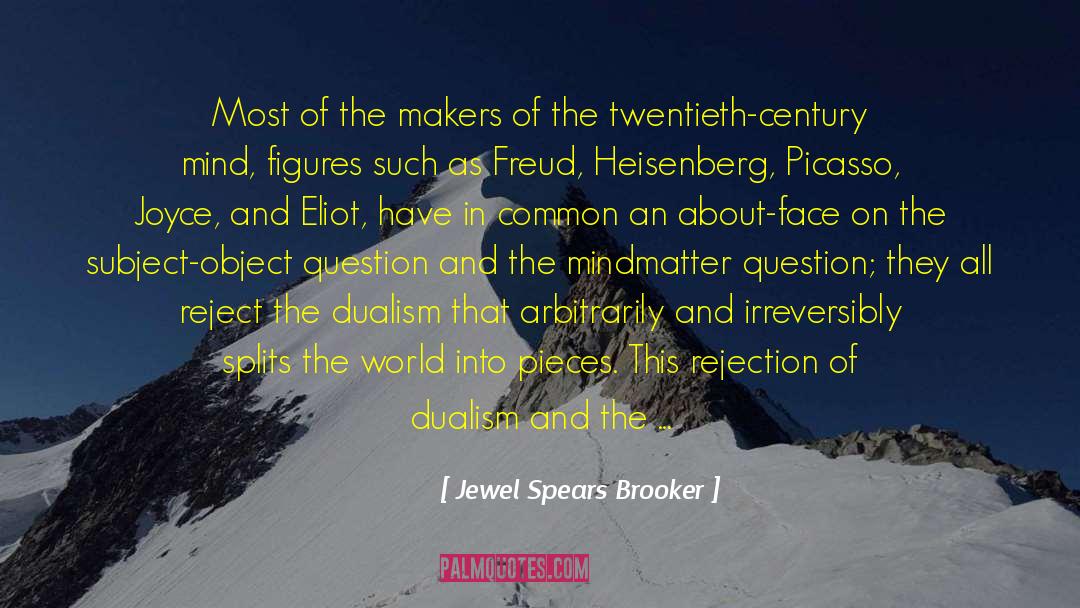Jewel Spears Brooker Famous Quotes
Reading Jewel Spears Brooker quotes, download and share images of famous quotes by Jewel Spears Brooker. Righ click to see or save pictures of Jewel Spears Brooker quotes that you can use as your wallpaper for free.
The best of the New Critics were masters of close readings. Cleanth Brooks, for example, in 1937 wrote a detailed commentary on The Waste Land which is still a model of critical helpfulness. The fact that certain basic insights in the past generation have originated as reactions against Brooks and his colleagues does not in any way diminish their excellence.
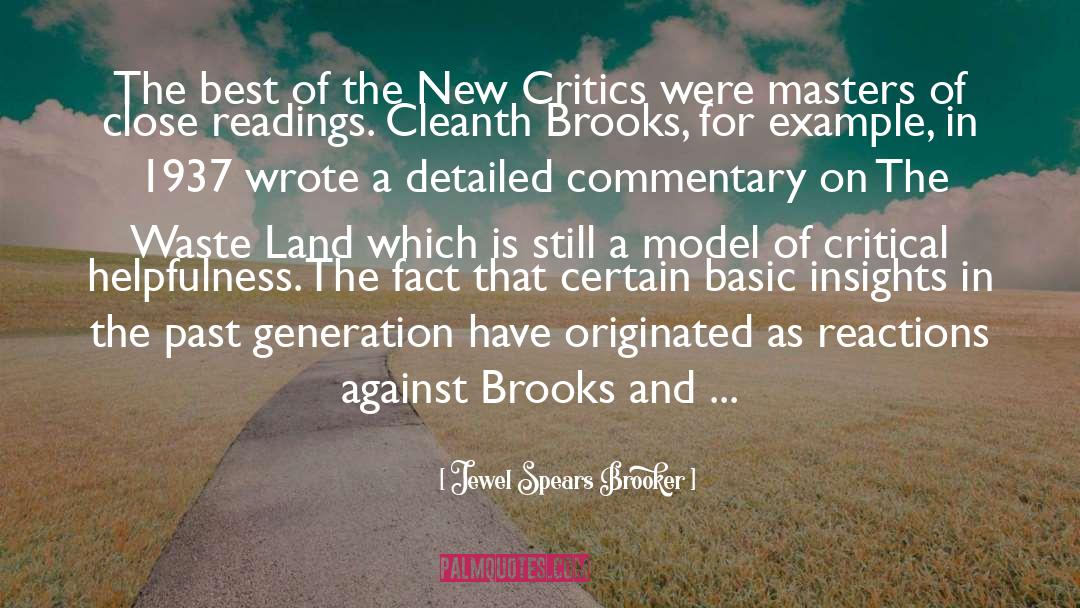
One problem with the work of the New Critics was that their close readings, no matter how brilliant, could not deliver all they seemed to promise.
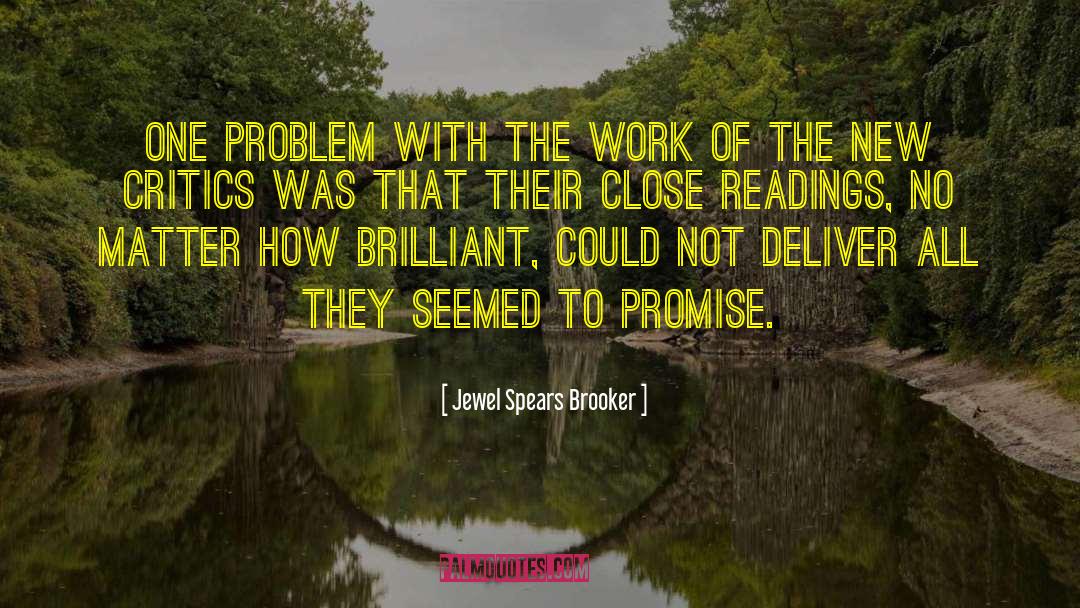
The Stetson passage is an allusion to Frazer theory in The Golden Bough that religion originated as agricultural engineering. Through a grotesque process of literalization, all of the dying gods and heroes in The Golden Bough, along with Christ and the Fisher King, are transferred from mythic to modern consciousness ( Frazer himself was an unabashed positivist) to be made explicable in scientific terms as fertilizer.
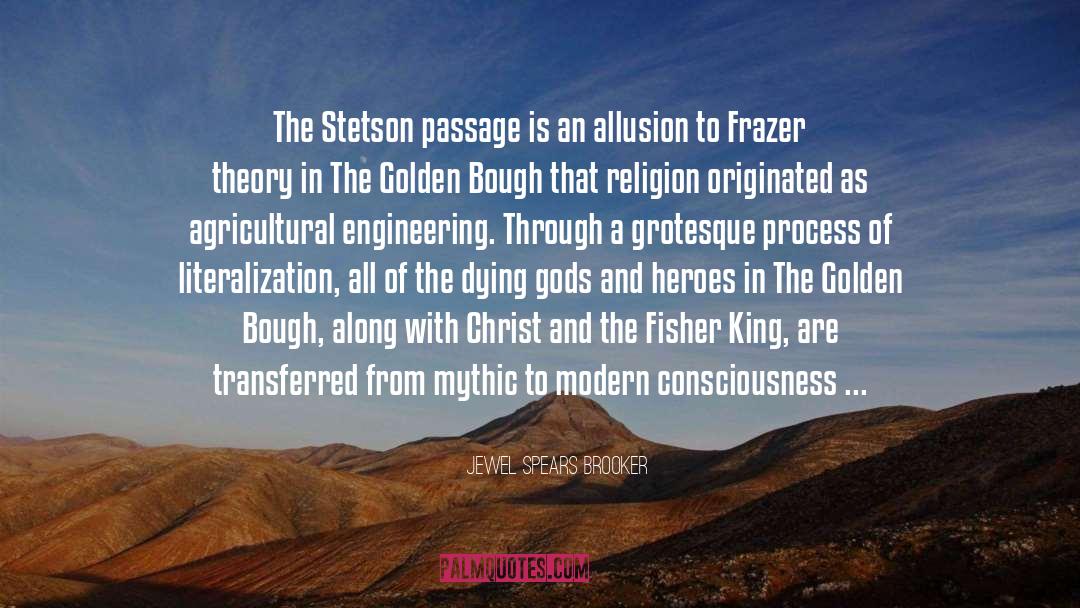
The decline of sustained close reading of Eliot is also related, ironically, to the emergence of historical scholarship regarding sources and allusions. The major figure here is Grover Smith, who in the midfifties published an encyclopedic study of Eliot's sources. 3 The mere existence of Smith's scholarly tome changed the shape of close readings of Eliot. The poet's allusions and sources moved to the foreground of concern, and although most readers of Eliot's poetry and plays benefited from Smith's work, others found themselves frustrated by the weight of the intellectual backgrounds.
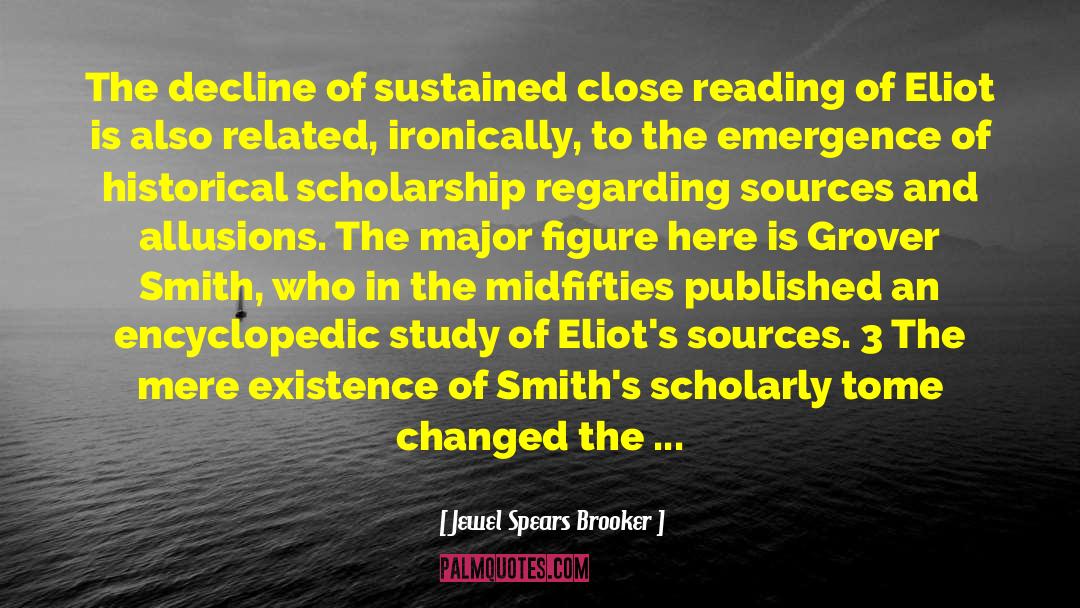
The Golden Bough captured the imagination of many artists in the early twentieth century. Eliot, certainly, was immersed in it, discussing it familiarly in his graduate school papers and book reviews and constantly alluding to it in his art. The most straightforward advice he offers to readers of The Waste Land (given in the notes to the poem) is, in paraphrase, that any serious reader of the poem must take into consideration modern scholarship in myth and anthropology, especially Frazer Golden Bough and Jessie Weston From Ritual to Romance. The poet says that he is indebted to this scholarship for his title, his plan, his symbolism, and many of his references to ancient religion and society. His claim about the title, taken from the monomyth of Frazer and Weston, his claim about the symbolism, associated with the birth-death-rebirth cycles of the myths, and his claim about the miscellaneous undergirding references have been discussed by Grover Smith and other scholars. We wish to focus more on Eliot's claim about being indebted to Frazer for the plan of the poem. We believe it refers, at least in part, to Frazer's use of the comparative method and to his practice of assembling many perspectives and allowing these perspectives to make his point.
It must be noted at once that Eliot was quite selective in his admiration of Frazer. For example, he did not admire Frazer's positivism. Frazer put his faith in science and celebrated what he called the evolution from magic
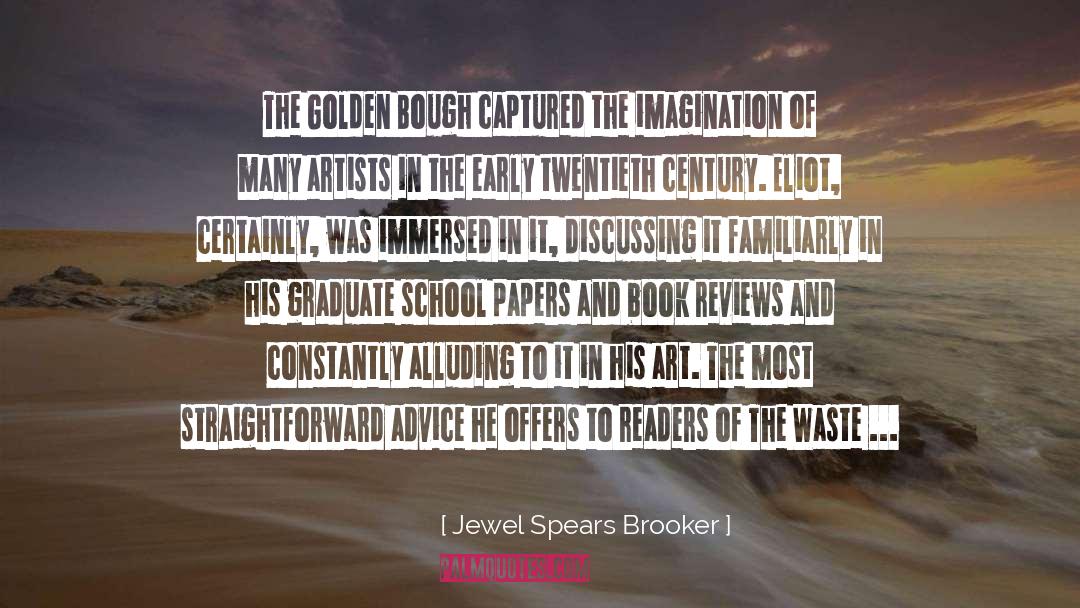
Eliot's understanding of poetic epistemology is a version of Bradley's theory, outlined in our second chapter, that knowing involves immediate, relational, and transcendent stages or levels. The poetic mind, like the ordinary mind, has at least two types of experience: The first consists largely of feeling (falling in love, smelling the cooking, hearing the noise of the typewriter), the second largely of thought (reading Spinoza). The first type of experience is sensuous, and it is also to a great extent monistic or immediate, for it does not require mediation through the mind; it exists before intellectual analysis, before the falling apart of experience into experiencer and experienced. The second type of experience, in contrast, is intellectual (to be known at all, it must be mediated through the mind) and sharply dualistic, in that it involves a breaking down of experience into subject and object. In the mind of the ordinary person, these two types of experience are and remain disparate. In the mind of the poet, these disparate experiences are somehow transcended and amalgamated into a new whole, a whole beyond and yet including subject and object, mind and matter. Eliot illustrates his explanation of poetic epistemology by saying that John Donne did not simply feel his feelings and think his thoughts; he felt his thoughts and thought his feelings. He was able to "feel his thought as immediately as the odour of a rose." Immediately" in this famous simile is a technical te
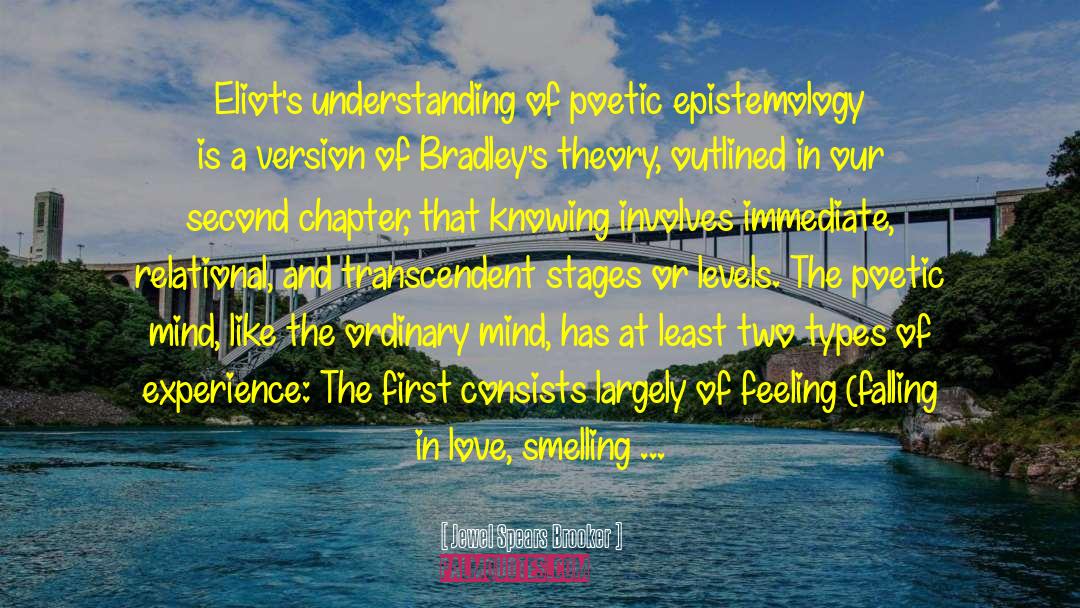
Eliot's own reflections on the primitive mind as a model for nondualistic thinking and on the nature and consequences of different modes of consciousness were informed by an excellent education in the social sciences and philosophy. As a prelude to our guided tour of the text of The Waste Land, we now turn to a brief survey of some of his intellectual preoccupations in the decade before he wrote it, preoccupations which in our view are enormously helpful in understanding the form of the poem. Eliot entered Harvard as a freshman in 1906 and finished his doctoral dissertation in 1916, with one of the academic years spent at the Sorbonne and one at Oxford. At Harvard and Oxford, he had as teachers some of modern philosophy's most distinguished individuals, including George Santayana, Josiah Royce, Bertrand Russell, and Harold Joachim; and while at the Sorbonne, he attended the lectures of Henri Bergson, a philosophic star in Paris in 1910-11. Under the supervision of Royce, Eliot wrote his dissertation on the epistemology of F. H. Bradley, a major voice in the late-nineteenth-, early-twentieth-century crisis in philosophy. Eliot extended this period of concentration on philosophical problems by devoting much of his time between 1915 and the early twenties to book reviewing. His education and early book reviewing occurred during the period of epistemological disorientation described in our first chapter, the period of "betweenness" described by Heidegger and Ortega y Gasset, the
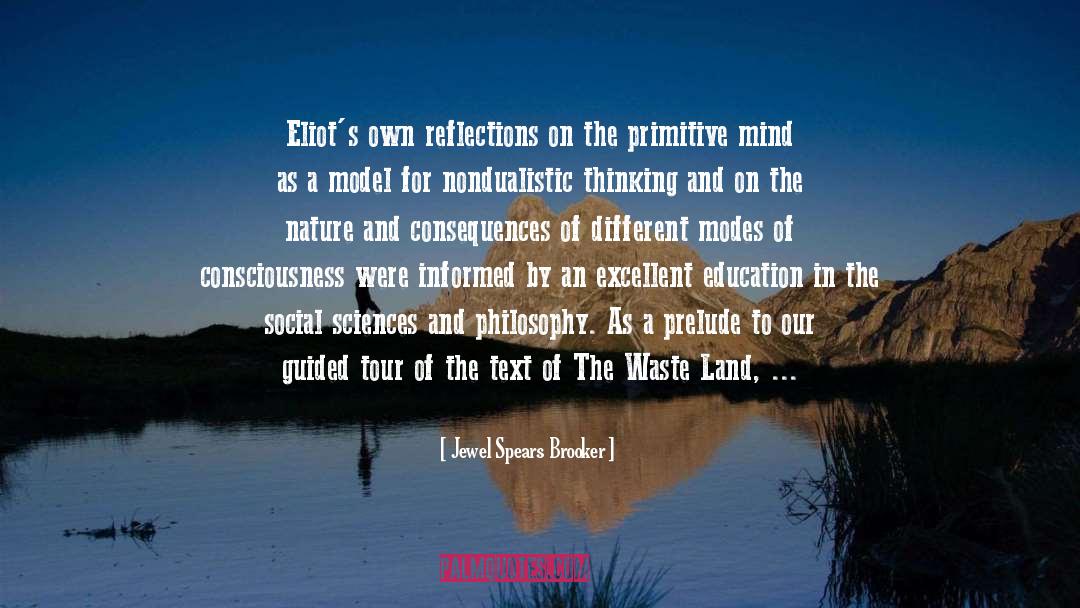
Most of the makers of the twentieth-century mind, figures such as Freud, Heisenberg, Picasso, Joyce, and Eliot, have in common an about-face on the subject-object question and the mindmatter question; they all reject the dualism that arbitrarily and irreversibly splits the world into pieces. This rejection of dualism and the corresponding reach for monism are of the essence in understanding the revolutionary nature of twentieth-century science and art.
